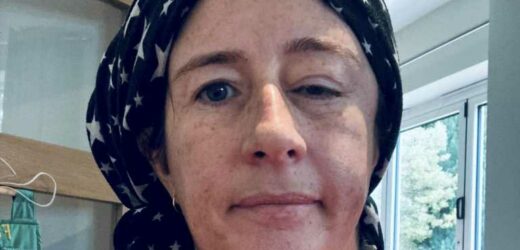A WOMAN thought her bloodshot eye was conjunctivitis, only to find out she had a potentially deadly tumour growing in her skull.
Kirsty Drury, from Tring, Hertfordshire, also considered that her sore right eye was caused by fatigue after she'd been working long hours.
The 45-year-old, who has four kids, saw her GP in November 2019.
She says she feels lucky that her doctor took her swollen eye seriously and sent her to hospital the same day for scans.
By the evening, she was told that she had a potentially fatal brain tumour.
Medics found that her so-called “pink eye” was in factor a symptom of a mass on her brain that was growing into her skull and affecting her muscles.
Kirsty, a manager at Transport for London, said: "When I first got told I had a brain tumour I thought it meant I was going to die.
"When you walk into the doctor's surgery with suspected conjunctivitis and walk out with a brain tumour, you can't be blamed for thinking the worst."
Kirsty was told she had a meningioma – a tumour that grows on the tissue covering the brain.
It causes symptoms of headaches, seizures, weakness in the limbs and loss of balance, memory or hearing.
Brain tumours may cause eyesight problems, such as blurred vision, sensitivity to light, dry and irritated eyes or abnormal eye movements.
Meningiomas are slow growing and sometimes symptoms don’t appear for years.
Kirsty’s consultant explained that in around 80 per cent of cases, a meningioma is benign (not cancer), but that the only way to find out for sure is to remove it.
But due to the Covid pandemic, Kirsty was unable to have surgery for months.
She said: "I had expected to have brain surgery towards the start of 2020 but that slipped into March and then Covid meant that only emergency operations were going ahead.
"How I didn't go mad in that time I have no idea.
“Although I was coping pretty well and running was helping, my mental health wasn't great because I was convinced that I was going to have a bad outcome, that I'd find out my tumour was growing faster than expected or that it was cancer.
"It was the first thing I thought of in the morning, the last thing I thought about at night and sometimes it woke me up too – I couldn't get any inner peace."
While in lockdown Kirsty couldn't help Googling her condition, which she says was a "terrible idea".
Cancer Research UK says "around 40 out of 100 peoplewith a grade 3 meningioma survive their cancer or 10 years or more".
Fortunately Kirsty’s tumour was considered stable and, when she was finally booked in for an operation on 26 November 2020, her tumour had barely grown.
The operation – which had huge risks – took a whopping 16 hours.
Not all of Kirsty's tumour could be removed as it would have put her facial muscles at risk.
But surgeons were able to take enough to find that her tumour was non-cancerous, meaning she can now live a healthy life.
Kirsty recalled being given that news on December 18, saying: “I felt a thirteen month weight begin to lift from my shoulders. I didn't cry on this occasion, I just smiled my first real smile in all that time.”
Now, Kirsty wants to raise awareness of brain tumours to help others to recognise the symptoms and treatment options.
She said: "That's why I support Brain Tumour Research because, like them, I feel passionate about the need to raise awareness and funds for research into brain tumours."
"I also want others to know that there are lots of people living with a brain tumour.
"For some reason, those stories aren't talked about but I think they should be because at the beginning of my journey I would have given anything to have more hope.
"I want to put that alternative story out there; it is possible to get your life back after brain surgery."
Kirsty has since returned to full-time work and is physically fit, regularly running 25km a week.
However, she suffers from pressure headaches and struggles with memory recall.
Brain Tumour Research funds research at dedicated centres in the UK. It also campaigns for the government and larger cancer charities to invest more in research into brain tumours.
The charity is calling for a national annual government spend of £35 million to improve survival rates and patient outcomes in line with other cancers such as breast cancer and leukaemia.
We pay for your stories!
Do you have a story for The Sun news desk?
Email us at [email protected] or call 0207 782 4104. You can WhatsApp us on 07423 720 250. We pay for videos too.
Click here to upload yours.
Click here to get The Sun newspaper delivered for FREE for the next six weeks.
Source: Read Full Article





